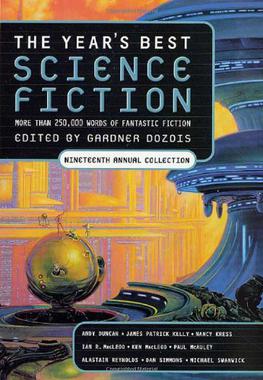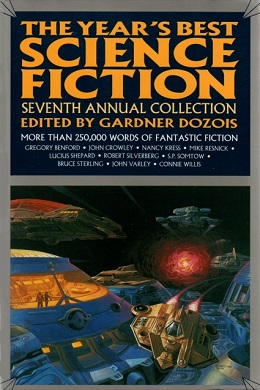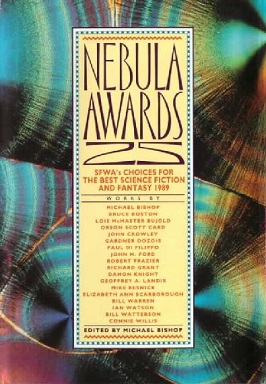
Alastair Preston Reynolds is a Welsh science fiction author. He specialises in hard science fiction and space opera.

Gardner Raymond Dozois was an American science fiction author and editor. He was the founding editor of The Year's Best Science Fiction anthologies (1984–2018) and was editor of Asimov's Science Fiction (1986–2004), garnering multiple Hugo and Locus Awards for those works almost every year. He also won the Nebula Award for Best Short Story twice. He was inducted to the Science Fiction Hall of Fame on June 25, 2011.

Damien Francis Broderick is an Australian science fiction and popular science writer and editor of some 74 books. His science fiction novel The Dreaming Dragons (1980) introduced the trope of the generation time machine, his The Judas Mandala (1982) contains the first appearance of the term "virtual reality" in science fiction, and his 1997 popular science book The Spike was the first to investigate the technological singularity in detail.

Asimov's Science Fiction is an American science fiction magazine edited by Sheila Williams and published by Dell Magazines, which is owned by Penny Press. It was launched as a quarterly by Davis Publications in 1977, after obtaining Isaac Asimov's consent for the use of his name. It was originally titled Isaac Asimov's Science Fiction Magazine, and was quickly successful, reaching a circulation of over 100,000 within a year, and switching to monthly publication within a couple of years. George H. Scithers, the first editor, published many new writers who went on to be successful in the genre. Scithers favored traditional stories without sex or obscenity; along with frequent humorous stories, this gave Asimov's a reputation for printing juvenile fiction, despite its success. Asimov was not part of the editorial team, but wrote editorials for the magazine.

Charles David George "Charlie" Stross is a British writer of science fiction and fantasy. Stross specialises in hard science fiction and space opera. Between 1994 and 2004, he was also an active writer for the magazine Computer Shopper and was responsible for its monthly Linux column. He stopped writing for the magazine to devote more time to novels. However, he continues to publish freelance articles on the Internet.

Interzone is a British fantasy and science fiction magazine. Published since 1982, Interzone is the eighth-longest-running English language science fiction magazine in history, and the longest-running British science fiction (SF) magazine. Stories published in Interzone have been finalists for the Hugo Awards and have won a Nebula Award and numerous British Science Fiction Awards.

The New Space Opera is a science fiction anthology edited by Gardner Dozois and Jonathan Strahan. It was published in 2007, and includes all original stories selected to represent the genre of space opera. It includes a five-page introduction, plus a brief introduction to each of the stories, and a dedication to Jack Dann. The front and back covers include endorsements by Orson Scott Card, Charles Stross, Joe Haldeman, Vernor Vinge, and Greg Bear. Ten out of the eighteen stories in the book were selected for the Locus recommended reading list for 2007.

The Year's Best Science Fiction: Twenty-Third Annual Collection is a science fiction anthology edited by Gardner Dozois that was published in 2006. It is the 23rd in The Year's Best Science Fiction series. It won the Locus Award for best anthology in 2007.

The Year's Best Science Fiction: Nineteenth Annual Collection is a science fiction anthology edited by Gardner Dozois that was published in 2002. It is the 19th in The Year's Best Science Fiction series. It received the Locus Award for best anthology in 2003.

One Million A.D. is a science fiction anthology edited by American writer Gardner Dozois, published in 2005.

The Year's Best Science Fiction: Twenty-Fifth Annual Collection is a science fiction anthology edited by Gardner Dozois that was published on July 8, 2008. It is the 25th in The Year's Best Science Fiction series and won the Locus Award for best anthology. The UK edition is titled The Mammoth Book Of Best New SF 21, the "21st Annual Collection" (ISBN 978-1845298289) and contains the same stories listed.

Saturn's Children is a 2008 science fiction novel by British author Charles Stross. Stross called it "a space opera and late-period [Robert A.] Heinlein tribute", specifically to Heinlein's 1982 novel Friday.

The Year's Best Science Fiction: Fourteenth Annual Collection is a science fiction anthology edited by Gardner Dozois that was published in 1997. It is the 14th in The Year's Best Science Fiction series. The collection won the Locus Award for best anthology.

The Year's Best Science Fiction: Twelfth Annual Collection is a science fiction anthology edited by Gardner Dozois that was published in 1995. It is the 12th in The Year's Best Science Fiction series and won the Locus Award for best anthology.

The Year's Best Science Fiction: Ninth Annual Collection is a science fiction anthology edited by Gardner Dozois that was published in 1992. It is the 9th in The Year's Best Science Fiction series and won the Locus Award for best anthology.

The Year's Best Science Fiction: Seventh Annual Collection is a science fiction anthology edited by Gardner Dozois that was published in 1990. It is the 7th in The Year's Best Science Fiction series and won the Locus Award for best Anthology in 1991.

Reactor, formerly Tor.com, is an online science fiction and fantasy magazine published by Tor Books, a division of Macmillan Publishers. The magazine publishes articles, reviews, original short fiction, re-reads and commentary on speculative fiction. Unlike traditional print magazines like Asimov's or Analog, it releases online fiction that can be read free of charge.

The Year's Best Science Fiction: Twentieth Annual Collection is an anthology of science fiction short stories edited by Gardner Dozois, the twentieth volume in an ongoing series. It was first published in hardcover and trade paperback by St. Martin's Press in July 2003, with a book club edition co-issued with the Science Fiction Book Club, and an ebook edition following in August of the same year. The first British edition was published in trade paperback by Robinson in December 2003, under the alternate title The Mammoth Book of Best New Science Fiction: 16th Annual Collection.

This is a complete list of works by American author Robin Hobb, the pen name of Margaret Astrid Lindholm Ogden, who also writes under the pen name Megan Lindholm.

Nebula Awards 25 is an anthology of award winning science fiction short works edited by Michael Bishop, the third of three successive volumes published under his editorship. It was first published in hardcover and trade paperback by Harcourt Brace Jovanovich in April 1991.



















